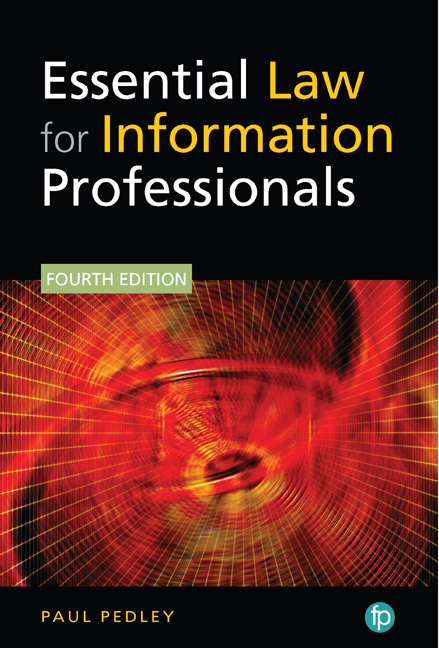Book contents
- Frontmatter
- Dedication
- Contents
- Disclaimer
- List of Figures and Tables
- Table of Statutes, Etc.
- Table of Cases
- Abbreviations
- Glossary of Terms
- Preface
- Chapter 1 General law and background
- Chapter 2 Library Law
- Chapter 3 Copyright
- Chapter 4 Legal Deposit
- Chapter 5 Breach of Confidence
- Chapter 6 Contracts and Licensing Agreements
- Chapter 7 Data Protection
- Chapter 8 Privacy
- Chapter 9 Freedom of Information
- Chapter 10 Human Rights
- Chapter 11 Re-use of Public Sector Information
- Chapter 12 Defamation
- Chapter 13 Professional Liability
- Chapter 14 Cybersecurity and Cybercrime
- Chapter 15 Disability Discrimination
- Chapter 16 Other Legal Issues Relevant to Librarians
- References
- Appendix 1 Brexit and the Orphan Works Exception
- Appendix 2 CILIP'S Ethical Framework
- Index
- Frontmatter
- Dedication
- Contents
- Disclaimer
- List of Figures and Tables
- Table of Statutes, Etc.
- Table of Cases
- Abbreviations
- Glossary of Terms
- Preface
- Chapter 1 General law and background
- Chapter 2 Library Law
- Chapter 3 Copyright
- Chapter 4 Legal Deposit
- Chapter 5 Breach of Confidence
- Chapter 6 Contracts and Licensing Agreements
- Chapter 7 Data Protection
- Chapter 8 Privacy
- Chapter 9 Freedom of Information
- Chapter 10 Human Rights
- Chapter 11 Re-use of Public Sector Information
- Chapter 12 Defamation
- Chapter 13 Professional Liability
- Chapter 14 Cybersecurity and Cybercrime
- Chapter 15 Disability Discrimination
- Chapter 16 Other Legal Issues Relevant to Librarians
- References
- Appendix 1 Brexit and the Orphan Works Exception
- Appendix 2 CILIP'S Ethical Framework
- Index
Summary
General principles
Copyright is the right to prevent the copying of work that has been created by intellectual effort. It protects information and ideas where these have been reduced into the form of a ‘work’. Copyright is augmented by ‘database right’ – a sui generis right to prevent extraction and reutilisation of all or a substantial part of a database.
Copyright subsists in:
• Original literary, dramatic, musical or artistic works.
• Sound recordings, films or broadcasts.
• The typographical arrangement of published editions.
Article 27 of the Universal Declaration of Human Rights (http://un.org/en/ universal-declaration-human-rights), adopted by the United Nations General Assembly on 10 December 1948, says:
(1) Everyone has the right freely to participate in the cultural life of the community, to enjoy the arts and to share in scientific advancement and its benefits.
(2) Everyone has the right to the protection of the moral and material interests resulting from any scientific, literary or artistic production of which he is the author.
There are clearly tensions between the need to give authors protection for their work and the need to allow people access to material for the betterment of society, to promote education, science and scholarship. That is why the monopoly rights that the law confers on the owners of copyright have several built-in safeguards. These include a number of permitted acts or copyright exceptions such as fair dealing (see Section 3.4.1). Another safeguard is putting a limit on the period of copyright protection, after which works enter the public domain. (The public domain comprises the body of all creative works in which no person or organisation has any proprietary interest.)
Copyright protection is automatic. It is not necessary to go through a registration process before copyright can be claimed. The corollary of this is that there isn't a comprehensive database of works protected by copyright with details of their rights owners.
Legal deposit (see Chapter 4) is not a prerequisite for claiming copyright protection. One myth is that if there is no copyright symbol on a work then it is not protected by copyright. Most countries (177 states as at April 2019) around the world are signatories to the Berne Convention for the Protection of Literary and Artistic Works (www.wipo.int/treaties/en/ip/berne/) and this provides for the automatic protection of works, without any formality.
- Type
- Chapter
- Information
- Essential Law for Information Professionals , pp. 29 - 98Publisher: FacetPrint publication year: 2019



